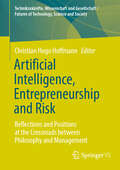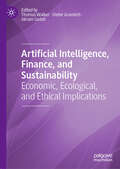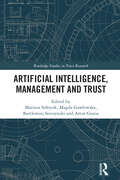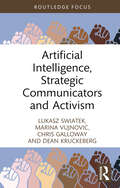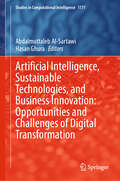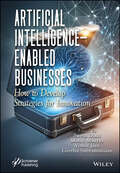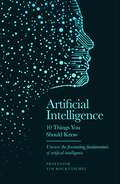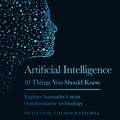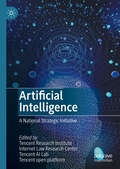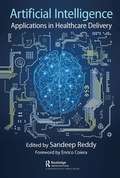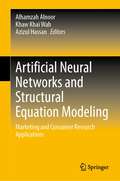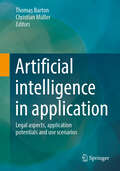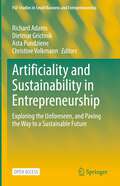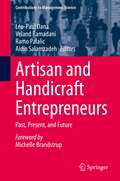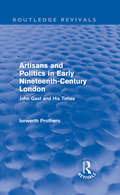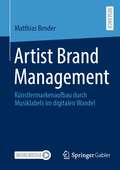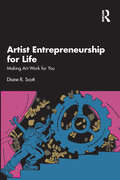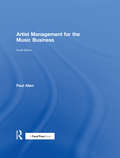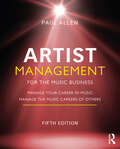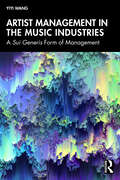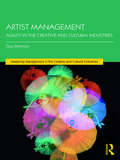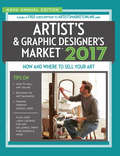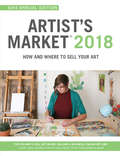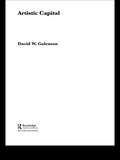- Table View
- List View
Artificial Intelligence, Entrepreneurship and Risk: Reflections and Positions at the Crossroads between Philosophy and Management (Technikzukünfte, Wissenschaft und Gesellschaft / Futures of Technology, Science and Society)
by Christian Hugo HoffmannThis book embarks on a thought-provoking journey that seeks to illuminate the intricate connections between the dynamic realms of AI, Entrepreneurship and Risk Management. This book illuminates the philosophical foundations of AI, examines the fundamental beliefs surrounding AI's nature, and its effects for the human condition. Drawing on the works of eminent philosophers, economists and business leaders alike, the authors of this volume engage in inspirational discussions on ethics, philosophy of technology, and the potential societal ramifications of advancing AI technologies. By grounding the exploration in philosophical reflections, the authors set the stage for a comprehensive understanding of AI's role in entrepreneurship and the inherent risks it entails.
Artificial Intelligence, Finance, and Sustainability: Economic, Ecological, and Ethical Implications
by Thomas Walker Dieter Gramlich Akram SadatiAs the world increasingly recognizes the importance of sustainability, businesses and investors are looking for ways to integrate sustainable practices into their operations and investment decisions. At the same time, advancements in artificial intelligence (AI) and technology are transforming the finance industry and are enabling more data-driven decision-making. The intersection of these fields presents a significant opportunity to accelerate progress towards a more sustainable future, while also improving financial performance. This book explores the crucial role of AI in sustainability and finance, examining how financial technologies and machine learning are shaping the approach of finance professionals towards environmental, social, and governance (ESG) issues. It provides a comprehensive and integrated perspective on how these areas are becoming increasingly intertwined and examines the ethical and social implications of AI in finance and its potential to unlock new opportunities for sustainability. By focusing on the practical implications of these intersections and including both case studies and expert analysis, the book provides valuable insights for practitioners, policymakers, academics, and students alike.
Artificial Intelligence, Management and Trust (Routledge Studies in Trust Research)
by Mariusz Sołtysik Magda Gawłowska Bartlomiej Sniezynski Artur GuniaThe main challenge related to the development of artificial intelligence (AI) is to establish harmonious human-AI relations, necessary for the proper use of its potential. AI will eventually transform many businesses and industries; its pace of development is influenced by the lack of trust on the part of society. AI autonomous decision-making is still in its infancy, but use cases are evolving at an ever-faster pace. Over time, AI will be responsible for making more decisions, and those decisions will be of greater importance. The monograph aims to comprehensively describe AI technology in three aspects: organizational, psychological, and technological in the context of the increasingly bold use of this technology in management. Recognizing the differences between trust in people and AI agents and identifying the key psychological factors that determine the development of trust in AI is crucial for the development of modern Industry 4.0 organizations. So far, little is known about trust in human-AI relationships and almost nothing about the psychological mechanisms involved. The monograph will contribute to a better understanding of how trust is built between people and AI agents, what makes AI agents trustworthy, and how their morality is assessed. It will therefore be of interest to researchers, academics, practitioners, and advanced students with an interest in trust research, management of technology and innovation, and organizational management.
Artificial Intelligence, Strategic Communicators and Activism (Global PR Insights)
by Marina Vujnovic Dean Kruckeberg Lukasz Swiatek Chris GallowayIn a world that is increasingly wary of artificial intelligence (AI), this book explores the pressing need for strategic communicators to move away from being advocates for AI and move towards a more critical activist role that enables them to counter AI-driven threats to communities and relationships. AI is contributing to inequality, misinformation and environmental damage, among other problems. This book argues that strategic communicators are uniquely placed to help counter AI-driven challenges because of their skills in relationship-building and their ability to craft and deliver messages effectively. By discussing the different professional activist approaches that communicators can take in relation to growing AI challenges, the book offers multiple perspectives that will help to build knowledge in diverse settings and develop practice, especially in community and activist strategic communication. Research-based and combining theory with practice, this thought-provoking book will be welcomed by strategic communication scholars and practitioners alike eager to develop a critical approach to the challenges surrounding AI.
Artificial Intelligence, Sustainable Technologies, and Business Innovation: Opportunities and Challenges of Digital Transformation (Studies in Computational Intelligence #1171)
by Abdalmuttaleb Al-Sartawi Hasan GhuraThis book offers a comprehensive exploration of the symbiotic relationship between artificial intelligence, sustainable technologies, and business innovation. Innovation has always been the main engine of an improved standard of living throughout history. However, the process of innovation can be highly disruptive as it makes more conventional technologies obsolete This book presents trendy and important topics such as open innovation and sustainability of Islamic Banks, Fintech, financial inclusion, IOT, business intelligence capabilities, innovation through AI, circular economy practices, and trends in cybersecurity. The reader-base from diverse backgrounds, including scholars, industry experts, policymakers, and students, engage with the perspectives and topics discussed in this book. By understanding the opportunities and challenges of this dynamic landscape, the authors can collectively work together to shape a future where technology and sustainability co-exist to drive positive change.
Artificial Intelligence-Enabled Businesses: How to Develop Strategies for Innovation
by Vishal Jain Mohit Maurya Sweta Dixit Geetha SubramaniamThis book has a multidimensional perspective on AI solutions for business innovation and real-life case studies to achieve competitive advantage and drive growth in the evolving digital landscape. Artificial Intelligence-Enabled Businesses demonstrates how AI is a catalyst for change in business functional areas. Though still in the experimental phase, AI is instrumental in redefining the workforce, predicting consumer behavior, solving real-life marketing dynamics and modifications, recommending products and content, foreseeing demand, analyzing costs, strategizing, managing big data, enabling collaboration of cross-entities, and sparking new ethical, social and regulatory implications for business. Thus, AI can effectively guide the future of financial services, trading, mobile banking, last-mile delivery, logistics, and supply chain with a solution-oriented focus on discrete business problems. Furthermore, it is expected to educate leaders to act in an ever more accurate, complex, and sophisticated business environment with the combination of human and machine intelligence. The book offers effective, efficient, and strategically competent suggestions for handling new challenges and responsibilities and is aimed at leaders who wish to be more innovative. It covers the early stages of AI adoption by organizations across their functional areas and provides insightful guidance for practitioners in the suitable and timely adoption of AI. This book will greatly help to scale up AI by leveraging interdisciplinary collaboration with cross-functional, skill-diverse teams and result in a competitive advantage. Audience This book is for marketing professionals, organizational leaders, and researchers to leverage AI and new technologies across various business functions. It also fits the needs of academics, students, and trainers, providing insights, case studies, and practical strategies for driving growth in the rapidly evolving digital landscape.
Artificial Intelligence: 10 Things You Should Know (10 Things You Should Know)
by Professor Tim Rocktäschel"An excellent, extremely up-to-date overview of the most important technological revolution in human history." - Prof. Jeff Clune, University of British Columbia"If I were to recommend one book on AI, this would be it!" - Dr Edward Hughes, LSE & Google DeepMindExplore humanity's most transformative technology: artificial intelligence...In ten short and informative essays, Professor of AI at University College London, Tim Rocktäschel, reveals everything we need to know about artificial intelligence. From what the futures holds for AI and why it continues to improve with more data, to how superhuman AI is attainable and why we still have to fold our own laundry, discover all of this and much, much more!Artificial Intelligence: 10 Things You Should Know is an illuminating and engaging guide to the most important area of science and technology today.
Artificial Intelligence: 10 Things You Should Know (10 Things You Should Know)
by Professor Tim Rocktäschel"An excellent, extremely up-to-date overview of the most important technological revolution in human history." - Prof. Jeff Clune, University of British Columbia"If I were to recommend one book on AI, this would be it!" - Dr Edward Hughes, LSE & Google DeepMindExplore humanity's most transformative technology: artificial intelligence...In ten short and informative essays, Professor of AI at University College London, Tim Rocktäschel, reveals everything we need to know about artificial intelligence. From what the futures holds for AI and why it continues to improve with more data, to how superhuman AI is attainable and why we still have to fold our own laundry, discover all of this and much, much more!Artificial Intelligence: 10 Things You Should Know is an illuminating and engaging guide to the most important area of science and technology today.
Artificial Intelligence: 10 Things You Should Know (10 Things You Should Know)
by Professor Tim Rocktäschel"An excellent, extremely up-to-date overview of the most important technological revolution in human history." - Prof. Jeff Clune, University of British Columbia"If I were to recommend one book on AI, this would be it!" - Dr Edward Hughes, LSE & Google DeepMindExplore humanity's most transformative technology: artificial intelligence...In ten short and informative essays, Professor of AI at University College London, Tim Rocktäschel, reveals everything we need to know about artificial intelligence. From what the futures holds for AI and why it continues to improve with more data, to how superhuman AI is attainable and why we still have to fold our own laundry, discover all of this and much, much more!Artificial Intelligence: 10 Things You Should Know is an illuminating and engaging guide to the most important area of science and technology today.
Artificial Intelligence: A National Strategic Initiative
by Tencent Research Institute Caict Tencent Ai Lab Tencent Open PlatformThis book begins with the past and present of the subversive technology of artificial intelligence, clearly analyzes the overall picture, latest developments and development trends of the artificial intelligence industry, and conducts in-depth research on the competitive situation of various countries. The book also provides an in-depth analysis of the opportunities and challenges that artificial intelligence brings to individuals, businesses, and society. For readers who want to fully understand artificial intelligence, this book provides an important reference and is a must-read.
Artificial Intelligence: Applications in Healthcare Delivery
by Sandeep ReddyThe rediscovery of the potential of artificial intelligence (AI) to improve healthcare delivery and patient outcomes has led to an increasing application of AI techniques such as deep learning, computer vision, natural language processing, and robotics in the healthcare domain. Many governments and health authorities have prioritized the application of AI in the delivery of healthcare. Also, technological giants and leading universities have established teams dedicated to the application of AI in medicine. These trends will mean an expanded role for AI in the provision of healthcare. Yet, there is an incomplete understanding of what AI is and its potential for use in healthcare. This book discusses the different types of AI applicable to healthcare and their application in medicine, population health, genomics, healthcare administration, and delivery. Readers, especially healthcare professionals and managers, will find the book useful to understand the different types of AI and how they are relevant to healthcare delivery. The book provides examples of AI being applied in medicine, population health, genomics, healthcare administration, and delivery and how they can commence applying AI in their health services. Researchers and technology professionals will also find the book useful to note current trends in the application of AI in healthcare and initiate their own projects to enable the application of AI in healthcare/medical domains.
Artificial Neural Networks and Structural Equation Modeling: Marketing and Consumer Research Applications
by Azizul Hassan Alhamzah Alnoor Khaw Khai WahThis book goes into a detailed investigation of adapting artificial neural network (ANN) and structural equation modeling (SEM) techniques in marketing and consumer research. The aim of using a dual-stage SEM and ANN approach is to obtain linear and non-compensated relationships because the ANN method captures non-compensated relationships based on the black box technology of artificial intelligence. Hence, the ANN approach validates the results of the SEM method. In addition, such the novel emerging approach increases the validity of the prediction by determining the importance of the variables. Consequently, the number of studies using SEM-ANN has increased, but the different types of study cases that show customization of different processes in ANNs method combination with SEM are still unknown, and this aspect will be affecting to the generation results. Thus, there is a need for further investigation in marketing and consumer research. This book bridges the significant gap in this research area. The adoption of SEM and ANN techniques in social commerce and consumer research is massive all over the world. Such an expansion has generated more need to learn how to capture linear and non-compensatory relationships in such area. This book would be a valuable reading companion mainly for business and management students in higher academic organizations, professionals, policy-makers, and planners in the field of marketing. This book would also be appreciated by researchers who are keenly interested in social commerce and consumer research.
Artificial intelligence in application: Legal aspects, application potentials and use scenarios
by Thomas Barton Christian MüllerThe book shows application potentials of artificial intelligence in various industries and presents application scenarios on how a practical implementation can take place. The starting point is the description of legal aspects, which includes a European regulation for artificial intelligence and addresses the question of the permissibility of automated decisions. The description of various application potentials, mostly industry-related, and the presentation of some application scenarios form the focus of the topic volume. The book is based on the question of how artificial intelligence can be used in entrepreneurial practice. It offers important information that is just as relevant for practitioners as for students and teachers. This book is a translation of an original German edition. The translation was done with the help of artificial intelligence (machine translation by the service DeepL.com). A subsequent human revision was done primarily in terms of content, so that the book will read stylistically differently from a conventional translation.
Artificiality and Sustainability in Entrepreneurship: Exploring the Unforeseen, and Paving the Way to a Sustainable Future (FGF Studies in Small Business and Entrepreneurship)
by Richard Adams Dietmar Grichnik Asta Pundziene Christine VolkmannThis open access edited volume explores the past, present, and future of artificiality and sustainability in entrepreneurship – the unforeseen consequences and ways to advance to a sustainable future. In particular, it connects artificiality, sustainability and entrepreneurship, intertwining artificial with the specific phenomenon of those novel digital technologies that provoke continuous and significant change in our lives and business. Unlike digital entrepreneurship research, which focuses on digital technology development and management, this book covers processes and mechanisms of sustainable adaptability of entrepreneurs, the business logic of start-ups, and the collaborative behaviours under the mass digital transformation, including the prevalence of artificial intelligence. Some of the questions that this book answers are as follows: How has entrepreneurship reacted to such challenges previously? What lessons have been learned and need to be carried forward? How can entrepreneurship and the artefacts of entrepreneurship respond to current challenges? What should be the mindset of the entrepreneur to assure sustainable adaptation? How to embrace and embed the new business logic?
Artisan and Handicraft Entrepreneurs: Past, Present, and Future (Contributions to Management Science)
by Léo-Paul Dana Veland Ramadani Ramo Palalic Aidin SalamzadehIn handicrafts and artisanal products, industry has witnessed both a technological shift and a renewed interest among customers, especially after the challenges and limitations of mass production became evident under the COVID-19 pandemic. This book portrays the worldwide development of this trend, the nature of entrepreneurship in these industries, and the unique challenges and opportunities that entrepreneurs face. The book shows how these businesses are gaining a resurgence due to customers preferring ethical, regional, and climate-friendly options to fulfill their needs. The chapters focus on artisan entrepreneurs' contribution to society by not only creating businesses, but also in terms of tourism development. The book reiterates that artisan entrepreneurs enable crucial cultural connections with tradition due to their affinity to a region, city, village, or community. Small business and entrepreneurship researchers as well as policymakers in the cultural sector would benefit from this book.
Artisans and Politics in Early Nineteenth-Century London: John Gast and his Times (Routledge Revivals)
by Iorwerth ProtheroFirst published in 1979, this book was the first, full-length study of working-class movements in London between 1800 and the beginnings of Chartism in the later 1830s. The leaders and rank and file in these movements were almost invariably artisans, and this book examines the position of the skilled artisan in politics. Starting from the social ideals, outlook and the experience of the London artisan, Dr Prothero describes trade union, political, co-operative, educational and intellectual movements in the first forty years of the century. Setting a scene of alternating growth and contraction in trade, successive hostile governments and the increasing articulation of working-class consciousness the author shows that artisans could be no less militant, radical or anti-capitalist than other groups of working class men.
Artist Brand Management: Künstlermarkenaufbau durch Musiklabels im digitalen Wandel
by Matthias BenderDie Arbeit befasst sich mit den Auswirkungen der Digitalisierung auf die Markenbildung von Künstlern. Im Fokus der Ausführungen stehen Musiklabels, da sie im Wesentlichen für die Vermarktung von Künstlern verantwortlich und aufgrund technologischer Neuerungen mit einem sich ändernden Musikkonsum konfrontiert sind. Ziel der Arbeit ist es, die Kommunikationsinstrumente der Musiklabels zu identifizieren und hinsichtlich ihres Beitrags zum Künstlermarkenaufbau zu bewerten.
Artist Entrepreneurship for Life: Making Art Work for You
by Diane R. ScottHolistically addressing the documented needs of practicing artists, this book applies contemporary business management principles to the unique circumstances of people who make their living through creative expression.Artists looking to forge a career have had to turn to either entrepreneurship resources or professional practice tools specific to a discipline such as studio arts or theatre—but the business-school entrepreneurial approach conflicts with the way artists make work and the unique structures of the artist environment, while the professional practice focus neglects the necessary business theory and the wide range of ways artists create viable careers. For the first time, this book provides a comprehensive theoretical and practical foundation for understanding how artists create practices that endure. Employing a strategic management framework, the book spells out prevailing business strategies in marketing, finance, human resources, and the legal environment from an arts-specific and artist-friendly point of view. In a world of perpetually changing communication, distribution, and technology, it also offers a lasting framework and understanding of the broader arts economy, while highlighting contemporary tools and tactics to implement the theories in individual practices.Practicing artists and students preparing for a career in any of the arts disciplines will welcome the artist’s perspective and the many examples from the lives of working artists in a variety of endeavors, while instructors in arts management, administration, and entrepreneurship will appreciate this comprehensive text with research-based pedagogy addressing their needs.
Artist Management for the Music Business
by Paul AllenAnyone managing an artist’s career needs to be well versed and have a savvy understanding of the moving parts of the music business. You’ll learn how and why those moving parts "move," as well as how to manage and navigate a music-based career. Artist Management for the Music Business gives you a comprehensive view of how to generate income through music and how to strategically plan for future growth. The book is full of valuable practical insights. It includes interviews and case studies with examples of real-world management issues and outcomes. Updates to this new edition include the importance of online streaming to music careers, how anyone can effectively network, tools for successful negotiation, ways to identify and manage income sources, and guidance on the ever-changing social media landscape of the music business. This book gives you access to resources about artist management and the music business at its companion website, http://www.artistmanagementonline.com. There is no login, and the resources are updated regularly.
Artist Management for the Music Business: Manage Your Career in Music: Manage the Music Careers of Others
by Paul AllenAnyone managing an artist’s career needs to be well versed and have a savvy understanding of the moving parts of the music business. Learn how and why those moving parts "move," as well as how to manage and navigate a music-based career. Artist Management for the Music Business gives a comprehensive view of how to generate income through music and how to strategically plan for future growth. The book is full of valuable practical insights. It includes interviews and case studies with examples of real-world management issues and outcomes. Updates to this new edition include a new chapter for independent, self-managing artists, expanded and updated sections on networking, social media, and streaming, and a basic introduction to data analytics for the music business. This book gives access to resources about artist management and the music business at its companion website, www.artistmanagementonline.com.
Artist Management in the Music Industries: A Sui Generis Form of Management
by Yiyi WangArtist Management in the Music Industries: A Sui Generis Form of Management provides one of the first substantive, academic examinations of the role of an artist manager.This book deconstructs the nature of Artist Management, unveiling the pivotal role of the artist manager in creating and sustaining a dynamic environment referred to as the ‘Loop’, where success is realised by navigating four variables – Risks, Relationships, Emotions, and Expectations (2Rs and 2Es) – within and beyond the ‘Loop’. This book offers a new perspective on Artist Management as a sui generis discipline that does not fit easily inside standard conceptions of management.Featuring ethnography and interviews, this book sheds light on the realworld challenges and successes in the field. It is a must-read for researchers, students, and practitioners in the music business, music marketing, and artist management, offering invaluable insights into the practices that shape the cultural landscape.
Artist Management: Agility in the Creative and Cultural Industries (Mastering Management in the Creative and Cultural Industries)
by Guy MorrowArtists are creative workers who drive growth in the creative and cultural industries. Managing artistic talent is a unique challenge, and this concise book introduces and analyses its key characteristics. Artist Management: Agility in the Creative and Cultural Industries makes a major contribution to our understanding of the creative and cultural industries, of artistic and managerial creativities, and of social and cultural change in this sector. The book undertakes an extensive exploration of the increasingly pivotal role of artist managers in the creative and cultural industries and argues that agile management strategies are useful in this context. This book provides a comprehensive and accessible account of the artist–artist manager relationship in the twenty-first century. Drawing from research interviews conducted with artist managers and self-managed artists in five cities (New York, London, Toronto, Sydney and Melbourne), this book makes an original contribution to knowledge. Nation-specific case studies are highlighted as a means of illuminating various thematic concerns. This unique book is a major piece of research and a valuable study aid for both undergraduate and postgraduate students of subjects including arts management, creative and cultural industries studies, arts entrepreneurship, business and management studies and media and communications.
Artist's & Graphic Designer's Market 2017 (Market #2017)
by Noel RiveraBuild a successful art career! Do you want to establish or expand a career for yourself in fine art, illustration, or design? Then Artist's & Graphic Designer's Market 2017 is the must-have reference guide you need. Thousands of successful artists have relied on us to help develop their careers and navigate the changing business landscape. The Artist's & Graphic Designer's Market 2017 introduces a whole host of new features and guarantees the most up-to-date, individually verified market contacts possible. Grow your art business with these resources:A FREE 1-year subscription to ArtistsMarketOnline.com, where you can find industry contacts, track your submissions, get the latest art and design news, and much more.Complete, up-to-date contact information for more than 1,800 art market resources, including galleries, magazines, book publishers, greeting card companies, ad agencies, syndicates, art fairs, and more.Articles on the business of freelancing--from basic copyright information to tips on promoting your work.Information on grants, residencies, organizations, publications, and websites that offer support and direction for visual artists of all types.NEW! Informative articles on the art of customer service, creating a noteworthy portfolio, protecting your intellectual property, and adding teaching to your list of freelance possibilities.NEW! Special features on maintaining your motivation as a freelancer, brand marketing, etiquette for artists, and artists' assistants.NEW! Inspiring and informative interviews with successful professionals including illustrator Peter Sis, artists Seth Lyons and Kevin T. Kelly, and concept artists Gilles Beloeil and Lauren Airriess.
Artist's Market 2018: How and Where to Sell Your Art (Market #2018)
by Noel RiveraA successful art career at your fingertips! Do you want to establish or expand a career for yourself in fine art, illustration, or design? Artist's Market 2018 is the must-have reference guide you need. Thousands of successful artists have relied on us to help develop their careers and navigate the changing business landscape. Artist's Market 2018 includes the most up-to-date, individually verified market contacts possible. Grow your art business with these resources:Up-to-date contact information for more than 1,800 art market resources, including galleries, magazines, book publishers, greeting card companies, ad agencies, syndicates, art fairs, and moreArticles on the business of freelancing--from basic copyright information to tips on promoting your workInformation on grants, residencies, organizations, publications, and websites that offer support and direction for visual artists of all typesNEW! Articles on social media marketing, monitoring your copyright, how to get your work into a gallery, what art students need to know to prepare for a successful career, and a look at whether art loan programs might be right for you. In addition, read great interviews with successful artists Aaron Becker, Brianna Scharstein, and Katherine Chang Liu.
Artistic Capital
by David GalensonAt what stage of their careers do great artists produce their most important work? In a series of studies that bring new insights and new dimensions to the study of artistic creativity, Galenson’s new book examines the careers of more than one hundred modern painters, poets and novelists to reveal a powerful relationship between age and artistic creativity. Analyzing the careers of major literary and artistic figures, such as Cézanne, van Gogh, Dickens, Hemingway and Plath, Galenson highlights the different methods by which artists have made innovations. Pointing to a new and richer history of the modern arts, this book is of interest, not only to humanists and social scientists, but to anyone interested in the nature of human creativity in general.
